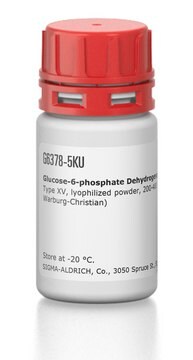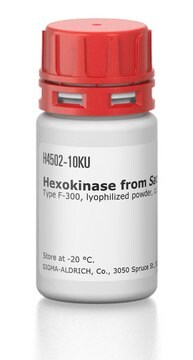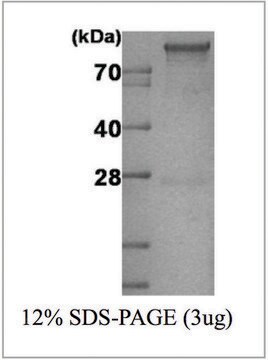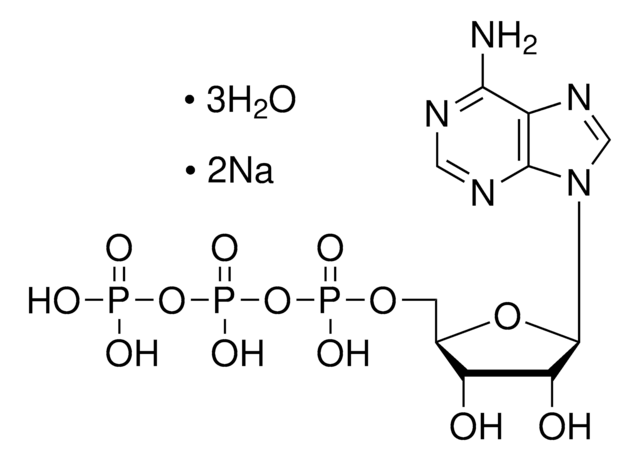HKG6PDH-RO
Roche
Hexokinase/Glucose-6-Phosphate Dehydrogenase (HK/G6P-DH)
from yeast/Leuconostoc, overproducer
Sinônimo(s):
G6P-DH, Glucose-6-Phosphate DehydrogenaseHK, Hexokinase
Faça loginpara ver os preços organizacionais e de contrato
About This Item
Código UNSPSC:
12352204
Produtos recomendados
fonte biológica
yeast
Nível de qualidade
Formulário
suspension
peso molecular
dimer 110,000 Da
embalagem
pkg of 10 mL (10737275001 [30 mg])
pkg of 5 mL (10127825001 [15 mg])
fabricante/nome comercial
Roche
concentração
3.21 mg/mL
técnica(s)
activity assay: suitable
cor
white
pH
5.5-6.5
solubilidade
water: miscible
adequação
suitable for UV spectrophotometry and general use
aplicação(ões)
life science and biopharma
temperatura de armazenamento
2-8°C
Categorias relacionadas
Descrição geral
Hexokinase is responsible for catalyzing the first step of glycolysis. It results in the formation of glucose-6-phosphate and ADP from glucose and ATP. Glucose-6-phosphate dehydrogenase is a crucial enzyme in the pentose phosphate pathway. It is responsible for the conversion of glucose-6-phosphate and NADP+ (nicotinamide adenine dinucleotide phosphate) to 6-phosphogluconolactone and NADPH.
Aplicação
Hexokinase/Glucose-6-phosphate dehydrogenase has been used for the determination of plasma glucose levels.
Componentes
EC 2.7.1.1 & 1.1.1.49
Definição da unidade
One unit (U) HK will phosphorylate 1 μmol of D-glucose in one minute at +25 °C and pH 7.6.
One unit (U) G6P-DH will oxidize 1 μmol of glucose-6-phosphate in one minute at +25 °C and pH 7.6.
The coupled assay produces 1 μmol of NADH per μmol of D-glucose phosphorylated.
Volume Activity: 340 U hexokinase/ml at +25 °C with glucose and ATP as the substrates. 170 U glucose-6-phosphate dehydrogenase/ml at +25 °C with glucose-6-phosphate as the substrate
One unit (U) G6P-DH will oxidize 1 μmol of glucose-6-phosphate in one minute at +25 °C and pH 7.6.
The coupled assay produces 1 μmol of NADH per μmol of D-glucose phosphorylated.
Volume Activity: 340 U hexokinase/ml at +25 °C with glucose and ATP as the substrates. 170 U glucose-6-phosphate dehydrogenase/ml at +25 °C with glucose-6-phosphate as the substrate
forma física
Suspension in 3.2 M ammonium sulfate solution, pH approximately 6. Prepared by mixing hexokinase with G6P-DH. HK:G6P-DH approximately 2:1 with regard to protein content.
Outras notas
For life science research only. Not for use in diagnostic prodcedures.
Código de classe de armazenamento
12 - Non Combustible Liquids
Classe de risco de água (WGK)
WGK 1
Ponto de fulgor (°F)
does not flash
Ponto de fulgor (°C)
does not flash
Escolha uma das versões mais recentes:
Já possui este produto?
Encontre a documentação dos produtos que você adquiriu recentemente na biblioteca de documentos.
Os clientes também visualizaram
H Pelicano et al.
Oncogene, 25(34), 4633-4646 (2006-08-08)
Most cancer cells exhibit increased glycolysis and use this metabolic pathway for generation of ATP as a main source of their energy supply. This phenomenon is known as the Warburg effect and is considered as one of the most fundamental
Miguel Vázquez-Velasco et al.
Nutricion hospitalaria, 32(6), 2718-2724 (2015-12-17)
Type 2 diabetes is a very prevalent chronic disease. Among dietary factors for its prevention and treatment, interest has grown in satiating fibre (konjac glucomannan) and spirulina. Our previous studies suggest that glucomannan itself and/or in conjunction to spirulina displayed
K Gottlob et al.
Genes & development, 15(11), 1406-1418 (2001-06-08)
The serine/threonine kinase Akt/PKB is a major downstream effector of growth factor-mediated cell survival. Activated Akt, like Bcl-2 and Bcl-xL, prevents closure of a PT pore component, the voltage-dependent anion channel (VDAC); intracellular acidification; mitochondrial hyperpolarization; and the decline in
Robert C Stanton
IUBMB life, 64(5), 362-369 (2012-03-21)
Glucose-6-phosphate dehydrogenase (G6PD) is the rate-limiting enzyme of the pentose phosphate pathway. Many scientists think that the roles and regulation of G6PD in physiology and pathophysiology have been well established as the enzyme was first identified 80 years ago. And
Global Trade Item Number
| SKU | GTIN |
|---|---|
| 10127825001 | 4061838667502 |
| 10737275001 | 4061838675026 |
Nossa equipe de cientistas tem experiência em todas as áreas de pesquisa, incluindo Life Sciences, ciência de materiais, síntese química, cromatografia, química analítica e muitas outras.
Entre em contato com a assistência técnica









